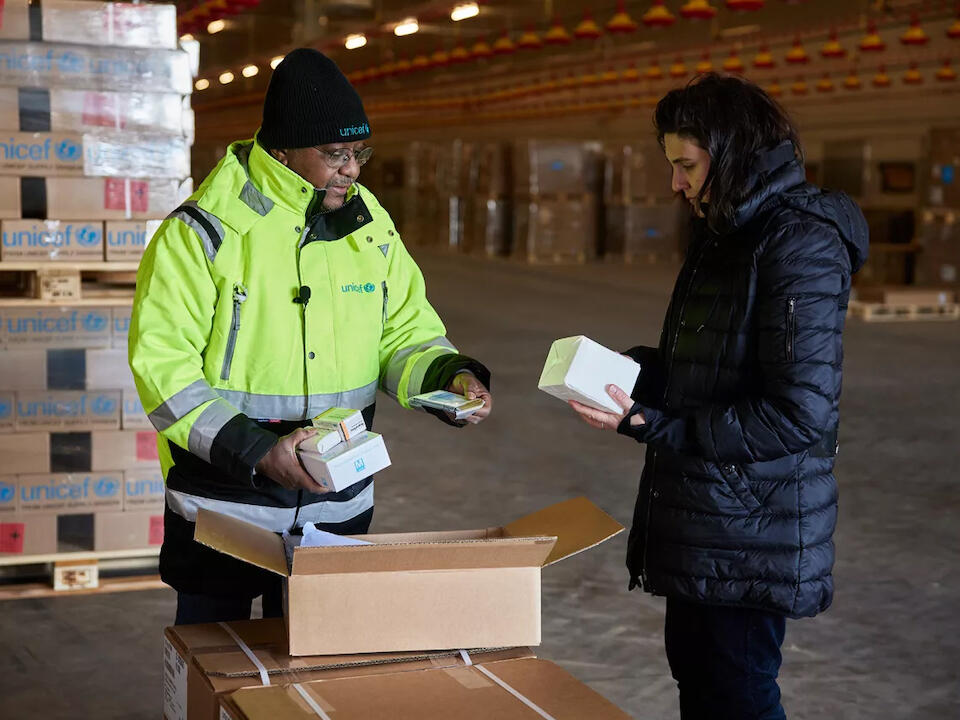What It's Like to Be a Supply Expert on a Surge Mission
Staff expertise plays a vital role in ensuring an effective UNICEF emergency response on the ground. Several UNICEF supply experts reflect on their experiences helping to scale up humanitarian aid operations in Afghanistan, Ukraine and elsewhere.
On the ground, playing a key role in UNICEF emergency response
UNICEF supply and logistics personnel are frequently deployed to assist and help scale UNICEF's response in a rapidly developing emergency.
From procurement to warehousing to distribution, supply experts bring invaluable technical know-how to the front lines of a crisis. They play a vital role in making sure that lifesaving supplies reach children who need them the most quickly and efficiently and in keeping with UNICEF's principles for humanitarian action (humanity, impartiality, neutrality and independence).
Medical and nutrition products, safe water and sanitation, as well as education and recreation supplies, must be appropriate for children in vulnerable situations and withstand the pressures of an emergency. The logistics of storing and transporting these supplies are complex, especially given the time-sensitive nature of an emergency response, requiring UNICEF teams to be ready and prepared to deal with whatever challenges arise.
Several individuals who recently completed surge deployment missions shared their thoughts about their experiences.
"You do not have time to doubt yourself"
Jaclyn Benche, Knowledge Management Officer with the UNICEF Supply Division's Strategy, Partnerships and Knowledge Management Center, joined the Emergency Coordination Unit supporting the delivery of supplies for children and their families affected by the war in Ukraine.
"My deployment was a great opportunity to gain insight into supply and logistics operations in an emergency," Benche said. "I witnessed the passionate drive for results, and commitment of UNICEF colleagues around the world to bring a better life for children.
"Thanks to the nature of working in an emergency, I discovered my creative side and skills I didn’t know I had. You do not have time to doubt yourself ... you just need to get things done efficiently and quickly."
From Iraq to Burkina Faso
Edgard Seikaly, Supply and Logistics Chief for UNICEF Iraq, was deployed to Burkina Faso to lead and guide the construction of more than 30 schools and advise on the supply of education-related products and services.
"I can write a book about the experience," Seikaly said. "Chapter 1 will be about one of the dozen schools where we delivered supplies under extreme pressure. Chapter 2 will be on the assessment of three oxygen plants. Chapter 3 will cover the launch of bidding and technical evaluations for construction works and long-term agreements [with local suppliers] for school supplies. Chapters 4 and 5 will be on political changes and getting malaria.
"The final chapter will be about the inspiration of being in Burkina Faso for three months and understanding the lengths a humanitarian will go to achieve results for children."
From Budapest to Kabul, Burundi to Myanmar
Alok Sharma, Contracts Specialist with UNICEF Supply Division working in the Global Shared Services Center in Budapest, was deployed to Kabul to support the local team in capacity building, and in the procurement and delivery of medicines and other urgently needed supplies.
"My deployment was a great and rewarding experience, both personally and professionally," Sharma said. "A lesson learned is to go prepared with clear terms of reference to start working from day one – but also be flexible, depending on the needs on the ground. I had the best opportunity to learn, plan and act in a delicate situation. During the mission, I found I had developed new skills, and I hope to have an opportunity to help again."
Félicité Hatungimana, Supply Officer with UNICEF Burundi, provided remote support to the UNICEF team in Myanmar responding to the enduring humanitarian and human rights crisis in the country.
"I helped the Myanmar Country Office move forward on many issues, including implementing [long-term vendor agreements] and contracts, which will allow them to respond to multiple emergencies in real time," Hatungimana said.
"Supporting Myanmar remotely taught me many things, especially on time management, sustainability and using a shared knowledge management platform. We conducted and analyzed bids online and used e-signatures, which are great for preserving the environment. I also got the opportunity to improve my English skills."

Omar Rjial, Warehouse Assistant at UNICEF's humanitarian supply hub in Copenhagen, was deployed to Ukraine less than a week after the war escalated in February 2022.
"It was very challenging," Rjial recalled. "[A]midst ongoing conflict, colleagues and I had to work on everything from setting up new warehouses to completing paperwork for supplies and identifying local transportation options. The biggest lesson for me when supporting emergencies is that you must be open to working in hostile environments and take up new challenges, because every day is different."
UNICEF staff are vital to every large-scale emergency response operation, providing a range of technical expertise that drives impact for children, from establishing new warehouses and procuring and distributing supplies to rebuilding schools and health facilities.
When partners contribute flexibly to UNICEF’s emergency response, UNICEF experts on the ground can effectively coordinate and allocate resources.
HOW TO HELP
There are many ways to make a difference
War, famine, poverty, natural disasters — threats to the world's children keep coming. But UNICEF won't stop working to keep children healthy and safe.
UNICEF works in over 190 countries and territories — more places than any other children's organization. UNICEF has the world's largest humanitarian warehouse and, when disaster strikes, can get supplies almost anywhere within 72 hours. Constantly innovating, always advocating for a better world for children, UNICEF works to ensure that every child can grow up healthy, educated, protected and respected.
Would you like to help give all children the opportunity to reach their full potential? There are many ways to get involved.





